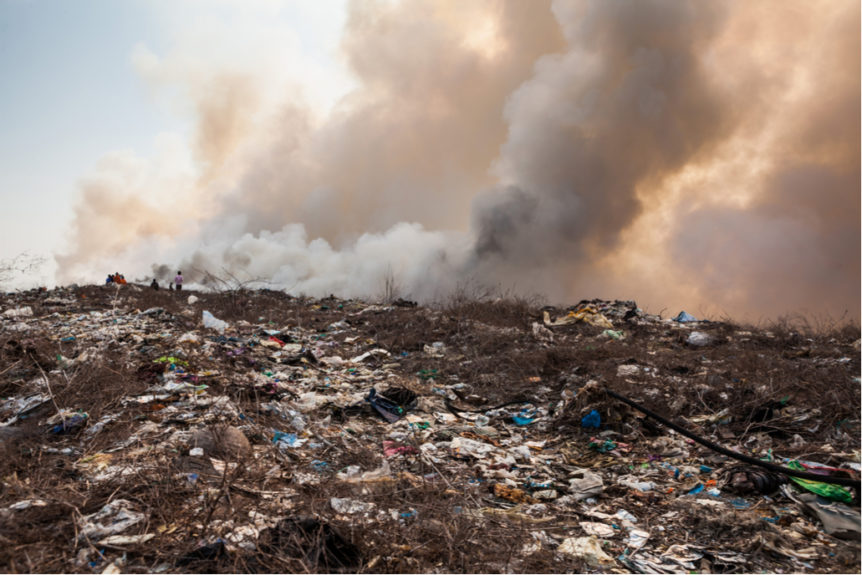Even though such operations often expose workers to toxic smoke and fumes and cause serious illness, the DoD still uses burn pits for most waste disposal.
In the early 2000s, when operations began in Afghanistan and Iraq, unregulated burn pits dotted the area and worker complaints about health conditions were summarily dismissed. The landscape changed in 2009, when in response to Congressional and public concerns about health risks, the DoD banned open-air pits at facilities with more than 100 personnel. Today, according to Col. Michael Lawhorn, there are no more burn pits in Afghanistan.
That is not the case in Iraq. When U.S. forces returned in late 2014, they brought burn pits with them. Indeed, according to a Government Accountability Office study, the DoD was not following its own rules regarding burn pit use. KBR, Inc., the largest burn pit operator, now faces a lawsuit in federal court from injured victims and their families. Dozens of similar cases have been consolidated with the action against KBR, and they are all pending in U.S. District Court for the District of Maryland.
42-year-old Sgt. First Class Fred Slape, who served two tours in Iraq and Afghanistan, died only eight weeks after doctors diagnosed him with advanced lung cancer. According to his widow, Sgt. Slape worker in the motor pool only a few feet away from open-air pits. Diane Slape said her husband described huge pits that burned anything and everything, and complaints to his supervisors about breathing problems fell on deaf ears.
As of November 2015, over 53,000 veterans had registered with Burn Pits 360, which the Veterans’ Administration set up to track related injuries.
Burn Pits
A burn pit is exactly what the name implies: a large hole in the ground where refuse is deposited and set afire; copious amounts of jet and diesel fuel keep the flames burning. According to military personnel, some of the more commonly-burned items are:
- Discarded Uniforms: Most of these clothes have flame-retardant treatments, and the fumes are known to have serious health effects.
- Rubber: These items include everything from discarded vehicle tires to portions of a roadway or jogging track.
- Medical Waste: Discarded syringes, used bandages, and other items are among the most toxic kinds of refuse.
- Other Solid Waste: Although everyday trash may not release toxic fumes, it does release a large amount of smoke that enables those fumes to travel over long distances.
The Veterans’ Administration found a link between burn pits and respiratory illness injuries in Iraq, in addition to gastrointestinal problems, cardiovascular issues, and other health concerns. 30% of participants in this study experienced some or all of these symptoms. Some of the more serious illnesses include:
- Constrictive Bronchiolitis: In this possibly fatal condition, scar tissue or inflammation narrows the airways. Symptoms begin with a dry cough and shortness of breath; the only known treatment is a lung transplant.
- Idiopathic Pulmonary Fibrosis: This condition is similar, except the scar tissue is thicker, the damage is worse, and the symptoms never improve.
Significantly, over a fifth of survey participants said they never had any symptoms until they were deployed.
Compensation Available
The Defense Base Act provides cash benefits for private contractors who were injured in Afghanistan while working for the DoD or any other U.S. government agency; in some cases, foreign government employees who work in similar circumstances are also eligible for compensation. The DBA covers a wide range of economic damages, including:
- Medical Expenses: In addition to hospital and doctor bills, victims are also entitled to compensation for rehabilitation expenses.
- Lost Wages: Essentially, the DBA calculates lost wages by comparing the percentage of disability with the worker’s prior wages.
- Death Benefits: In addition to funeral and burial expenses, a wide range of other benefits are available.
In order to determine the amount of future lost wages and medical bills, an attorney often partners with an expert witness. It is important to spend as much time and effort as needed to present a reasonable figure because once the cases settle, the injured victims normally waive rights to any future claims based on that incident.
If benefits are not forthcoming voluntarily, a request is made for a Formal Hearing (a trial) in front of a Federal Administrative Law Judge (ALJ). After hearing the evidence, there is normally a considerable wait before the ALJ issues an opinion. That finding is also appealable. The case can also be settled at any time; the ALJ must approve the terms of the settlement.
Partner With an Experienced Attorney
DBA cases are a niche area, and order to obtain maximum compensation, it is important to deal with a lawyer who routinely handles these matters. If you or a loved one was a private contractor working overseas for the U.S. government, and suffered injury or death in any capacity, contact Barnett, Lerner, Karsen & Frankel, P.A. today.

